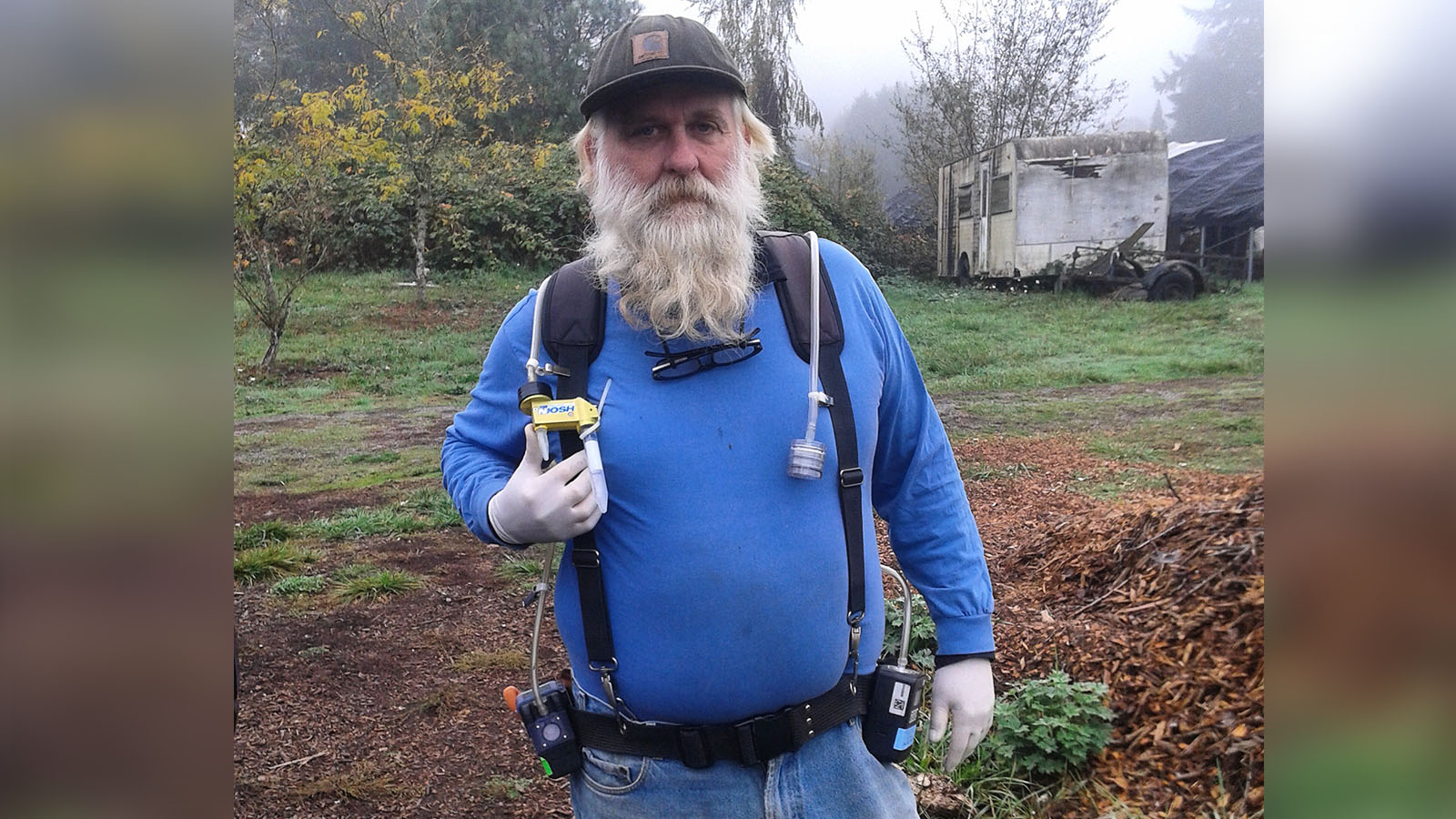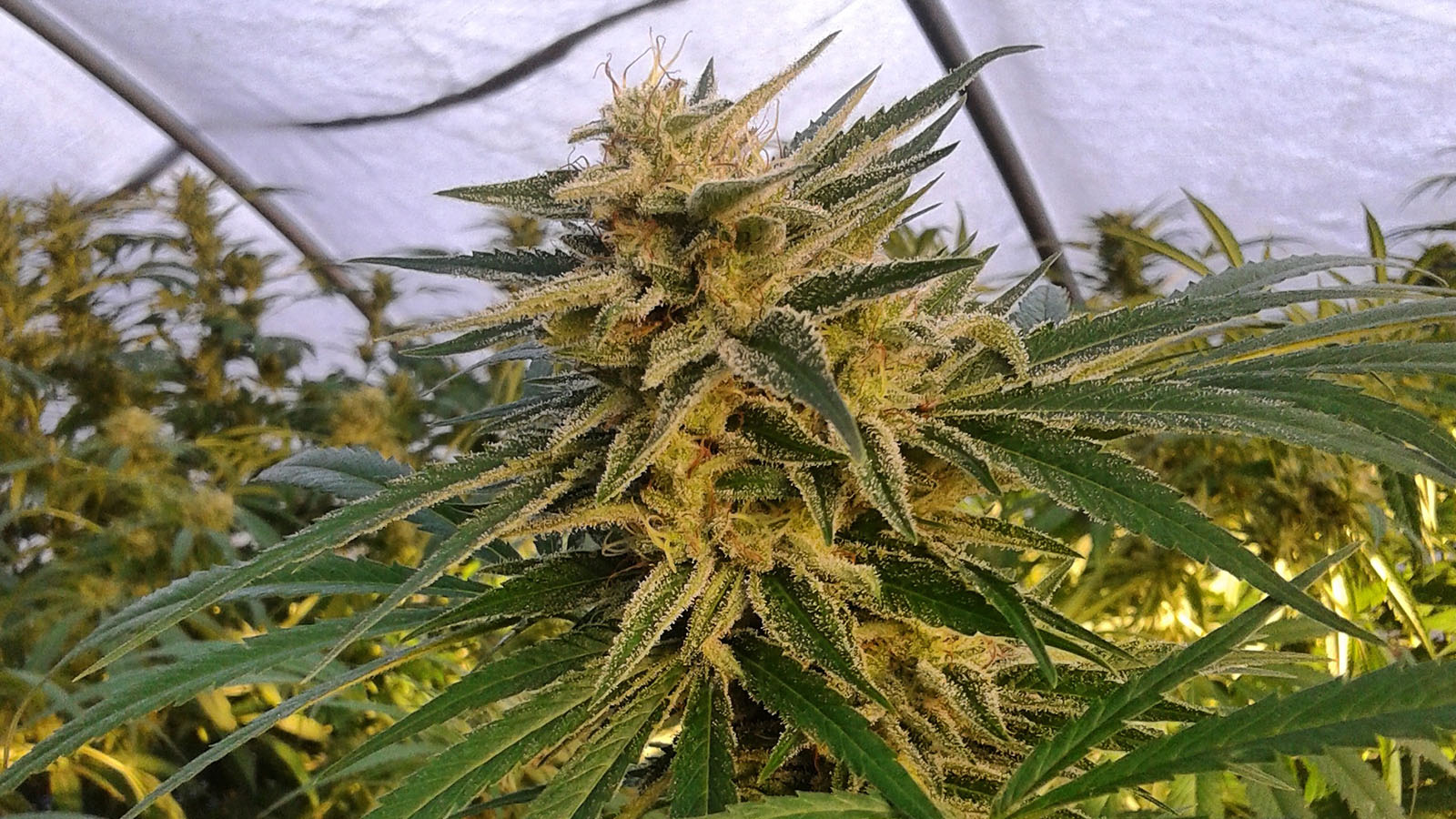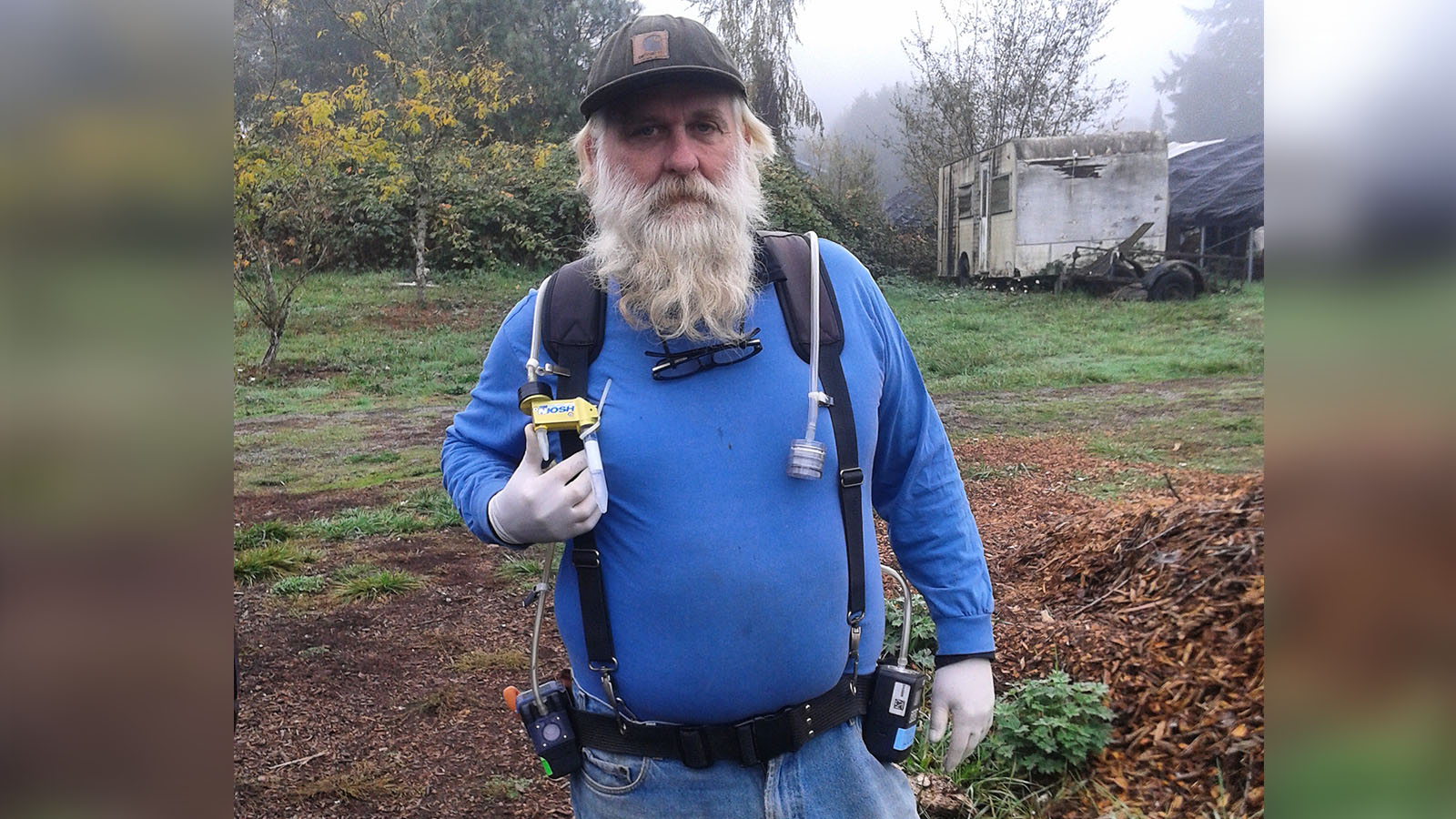Tom Lauerman, who prefers the handle “Farmer Tom Lauerman,” operates a 7-acre organic cannabis farm in Vancouver, Washington, with a focus on personal medical cannabis growing.
“I’m the only federally recognized organic cannabis farmer,” Lauerman said.
In 2015, scientists from the National Institute for Occupational Safety and Health’s (NIOSH) Industrial Hygiene Research Team for the Centers for Disease Control and Prevention (CDC) visited the farm for several days to compile a CDC report on Lauerman’s cannabis harvesting procedures.
The report refers to the operation as an “organic cannabis farm” in several places, including in its title, “Evaluation of Potential Hazards during Harvesting and Processing Cannabis at an Outdoor Organic Farm.”
That’s enough for Lauerman to feel comfortable with calling out the notable federal endorsement of his organic cannabis. Lauerman’s farm uses no bottled fertilizers or pesticides, instead opting for compost tea and the use of “trap plants,” such as bush beans and eggplant, to draw pests away from cannabis plants.

Tom Lauerman, who calls himself “Farmer Tom Lauerman,” runs a 7-acre cannabis farm in the Portland, Oregon, suburb of Vancouver, Washington. He boasts that he is the only federally recognized organic marijuana farmer in the U.S. The classification of cannabis as a controlled substance precludes it from receiving U.S. Department of Agriculture or state-level organic certification.
He uses well water, not “city water,” and uses only soil that hadn’t been previously used in farming other crops that were treated with fertilizer or pesticides that wouldn’t qualify as organic methods, he said.
“We grow as organically as possible,” Lauerman said.
The federal government treats cannabis as a controlled substance, so there is no official organic certification from the U.S. Department of Agriculture (USDA) and no official state government organic standards for cannabis. That leaves the organic world of marijuana largely ungoverned.
And it leaves a big gap for consumers seeking more seemingly clean lifestyles through the preferred use of organic products.
What is Organic Cannabis?
“Organic cannabis is more or less the same thing as an organic strawberry,” Ian Rice, vice president and co-founder of cannabis quality control business Envirocann, told Weedmaps News.
The Organic Trade Association in May 2018 revealed the results of a survey that shows 2017’s growth rate of the organic food market was six times the pace of the overall food market. Organic food sales in the U.S. reached a record $49.4 billion in 2017, up 6.4 percent from the previous year, according to the association.
That demand may be why there is no shortage of organic cannabis labels to be found on products, absent official federal logos. It could also be why local governments, organizations and private entities have pushed forward with the organic cannabis movement despite the lack of federal backing to give consumers peace of mind.
Enter Private Organic Certification
Washington passed a law in 2017 to create a voluntary program for the certification and regulation of organic marijuana products. Numerous certifying private entities like Envirocann have popped up to enable cannabis growers and sellers to offer customers an option of buying somewhat certifiable organic cannabis products.
Envirocann is a third-party certifier that confirms best practices and offers an organic-like certification option. The company currently operates in Oregon, Nevada, and California, and is one of many companies in the process of expanding to other states and internationally. The Santa Cruz, California-based business offers two certifications, which reflect local and state environmental compliance standards, and conducts onsite inspections and laboratory analysis. The certification requires two inspections per crop cycle while inspectors collect samples to be tested for pesticide residues.
The EnvirOganic certification means state and local environmental compliance are met and that organic management practices are being used, including “regenerative land stewardship.”
“The cannabis space has no way to confirm organic practices, and we are a solution to that,” Rice said, explaining the popularity of the company’s certifications.
The path to organic certification is much simpler for regular food producers. They can follow the National Organic Program (NOP), which is the federal regulatory framework governing organic food under the USDA, and then get certified through organizations recognized by the federal government, such as California Certified Organic Farmers or Oregon Tilth, two major federally recognized organic certifying associations.
However, companies like Envirocann can use the guidelines established in the NOP to certify a cannabis grower is using organic processes. According to Rice, Envirocann’s certification requirements exceed NOP standards.
‘Organic’ Isn’t Necessarily Chemical-free
Ethan Borg, vice president of extraction and product development at iAnthus Capital, which owns and operates dispensaries throughout the U.S., tossed a splash of cold water on the concept of organic cannabis.
A product can be considered organic, but that doesn’t necessarily mean it’s safe, according to Borg, who has a Master of Science in plant genetics from the University of Amsterdam. Borg’s work at iAnthus involves him having a big hand in operations at subsidiary GrowHealthy, a cannabis research, science, and cultivation company in Florida. GrowHealthy promotes itself for its “quality, all-natural, cannabis-derived products,” which it sells to Florida’s medical cannabis patients. Borg keyed in on safety and health when talking about organic cannabis.
“The trend with organic cannabis right now is it certainly is a hot topic,” Borg said. “I sort of equate it to the Whole Foods factor.”

Farmer Tom Lauerman says his organic farming safeguards for his cannabis crops include using well water, as opposed to municipal water sources, “trap plants” to lure insects away from his crop, and soil that had not been used to grow other crops that could have used chemical fertilizers or pesticides.
Borg believes a “pricing war” between cannabis sellers in the western U.S. is prompting some sellers to begin looking at developing organic-type products to vie for more conscientious consumers who may not be so stuck on price.
“There’s a race to the bottom right now in pricing,” he added. “You’ll see the verbiage of organically grown, and I don’t think that’s misinformation.”
However, Borg said an organic label shouldn’t preclude consumers asking questions like, “Where are these farmers getting nutrients for their soils?”
Bat or seabird guano, for example, are popular alternatives to synthetic fertilizers. But their use creates a risk of contaminants from heavy metals compounded in the systems of predators that are consuming animals and vegetation along the food chain where toxicants such as mercury may have seeped in, according to Borg.
In short, if the guano a farmer uses comes from a seabird whose diet consists mainly of mercury-heavy fish, there’s a risk that mercury will make it into their excrement and into the plants grown in soil fertilized with it.
“You end up getting a real substantial risk of putting mercury or other heavy metals in the soil from contaminants that are moving up the ecological food chain,” he said. “You can grow organically and use ecological and ethically sound practices, but you also have to have the analytics and knowledge behind that to be sure the product is still safe to consume.”
Another prevailing inaccurate assumption is that organic cannabis is pesticide-free. Some farms chose organic pesticides over synthetic pesticides to ensure they’re producing an organic crop, but organic pesticides are still pesticides, according to Borg.
“So, you’re putting more of those pesticides onto the plant and it’s really not pesticide-free,” he added.
Consumer Preference Wins in the End
Lauerman said he believes it will eventually come down to the taste test.
Consumers will continue seeking out more wholesome choices and they will eventually be able to notice the difference in taste and aroma between cannabis that has been farmed organically and cannabis that has not, he said.
“There’s a lot of traditional agricultural farms out there who believe in the chemical and chemical product that’s being used throughout all agriculture, but we do see the difference,” he said.











